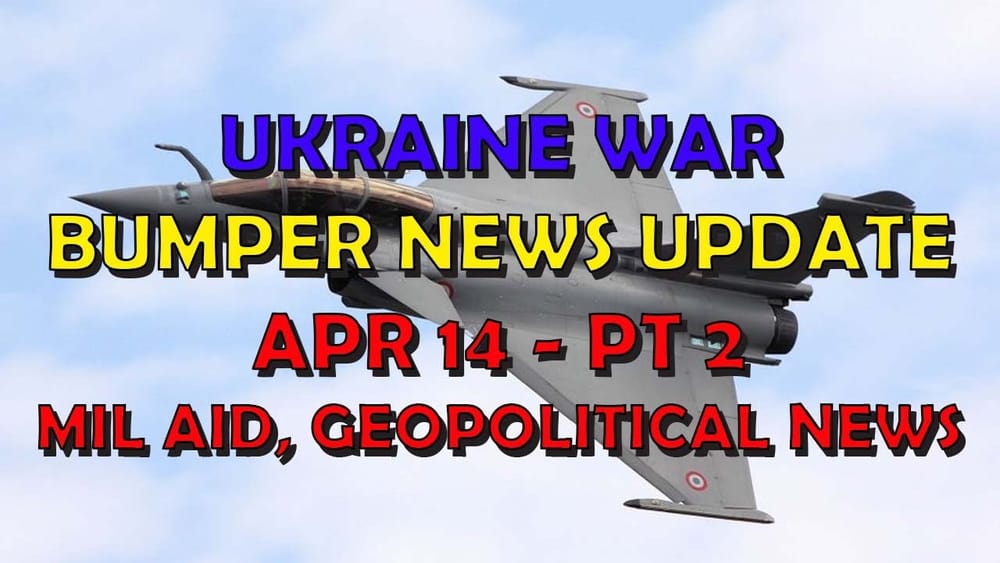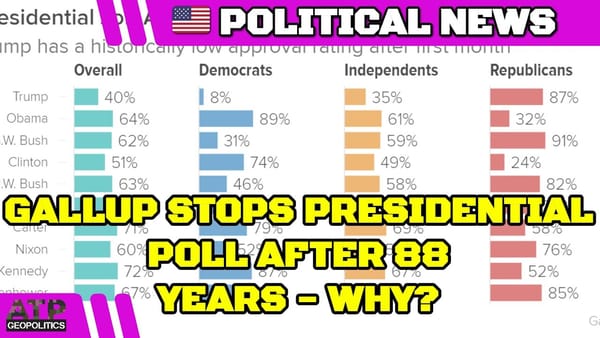Ukraine War Update NEWS: Military Aid & Geopolitical News
Table of Contents 📖
"Let's play chess here. Let's think about how do we get Serbia back into the sphere of influence of the EU? "
Hello Team
🎦 00:00-00:21⏩
Jonathan welcomes viewers to another video. Today's video is a Ukraine war news update focussed on military aid, equipment and geopolitics.
Return to top⤴️
Zelensky urges for increased military aid to Ukraine, citing Israel's successful defence against Iranian missile attacks.
🎦 00:21-01:57⏩
Zelensky draws a parallel with Israel's recent experience, highlighting the effectiveness of their air defence systems in intercepting a large number of missiles fired from Iran, in contrast to Ukraine's struggles to defend against significantly fewer attacks. He urges Western allies to provide Ukraine with similar advanced air defence equipment to counter Russian aggression. The US House of Representatives is considering a new draft law to support Israel following the Iranian attacks. It is hoped that this renewed momentum could also lead to the release of the stalled aid package for Ukraine.
Return to top⤴️
Germany to supply Patriot system to Ukraine
🎦 01:57-03:15⏩
Germany is to imminently deliver a Patriot air defence system to Ukraine. Whilst the specific model (PAC-2 or PAC-3) remains unconfirmed, the Ukrainian Air Force acknowledges the significance of even a single system in bolstering their air defence capabilities.
Return to top⤴️
Germany to supply additional IRIS-T system to Ukraine
🎦 03:15-05:07⏩
In addition to the Patriot system, Germany is also set to provide Ukraine with another IRIS-T air defence system. Ukraine is reportedly still waiting on a number of IRIS-T systems that were previously promised. Geminade, a Twitter user, notes that whilst additional IRIS-T SLM (medium range) systems may be announced, they are unlikely to be delivered before 2027. The Ukrainian ambassador to Germany clarifies that the delivery of a fourth IRIS-T SLM system, expected at the end of the 2023-2024 winter, is imminent. This suggests that the discussion revolves around previously pledged systems rather than new commitments. Geminade highlights that the primary bottleneck in IRIS-T production lies in missile manufacturing rather than launcher production, emphasizing the need for increased missile production capacity.
Return to top⤴️
Global Patriot System Inventory
🎦 05:07-08:23⏩
Jonathan discusses a TopLead infographic detailing the global inventory of Patriot systems.
- The US possesses 60 systems.
- Saudi Arabia has 18-25.
- Japan has 24, but weapons transfers are prohibited.
- Germany has approximately 10.
- The UAE has 6-9.
- Kuwait has 7-8.
- South Korea has 8.
- Taiwan has 7.
- Qatar has 4-6.
- Greece has 6.
- Israel has 4.
- Romania has around 4.
- Spain has 3.
- The Netherlands has approximately 3.
- Poland has 2.
- Sweden has 1.
Jonathan questions whether it would be more strategic for nations to donate individual launchers from their existing batteries to Ukraine, thus supplementing Ukraine's air defence capabilities while allowing donor countries to retain some level of protection. He acknowledges that while this approach might seem sensible, it's unclear whether the integrated fire control systems can accommodate additional launchers and if Ukraine has the capacity for such integration.
Return to top⤴️
France increases and expedites Aster missile deliveries to Ukraine
🎦 08:23-09:39⏩
France is significantly increasing and expediting its delivery of Aster missiles (ground-based anti-air and anti-missile weapons) to Ukraine. Initially, 200 Aster missiles, designed for the SAMP/T air defence system (a French/Italian equivalent to the Patriot system), were ordered at the start of 2023, with delivery scheduled for the end of 2025. France is now aiming to deliver these missiles by the end of 2024. Additionally, they plan to deliver six times the initially contracted amount by the end of 2025. This commitment to bolstering Ukraine's air defence capabilities is highlighted by Eric Beranger, CEO of MBDA (the missile's manufacturer). He emphasizes the exceptional capabilities of the Aster missile in defending against both aircraft and ballistic missiles, acknowledging the urgency of the situation and the need to protect the Ukrainian population.
Return to top⤴️
Lithuania increases military aid to Ukraine to €1.2 billion
🎦 09:39-11:37⏩
Lithuania is making a significant financial contribution to Ukraine's defence, allocating €1.2 billion in military aid this year. This funding will be channelled through the Ukraine Assistance Fund established by the EU, specifically for the procurement of ammunition and military equipment. This announcement, made by Lithuanian Interior Minister Agnė Bilotaitė during a press briefing in Lviv, highlights Lithuania's steadfast commitment to supporting Ukraine. Jonathan emphasizes the significance of Lithuania's contribution relative to its GDP, comparing it to a hypothetical US contribution of $400 billion to illustrate the scale of Lithuania's commitment. He challenges the narrative, often espoused by individuals like Donald Trump, that Europe isn't doing enough to support Ukraine, citing Lithuania as a prime example of a nation making substantial contributions disproportionate to its size.
Return to top⤴️
France pledges long-term military support to Ukraine
🎦 11:37-12:49⏩
France has reaffirmed its unwavering support for Ukraine, pledging to provide long-term military assistance until Russia is defeated. This commitment, underscored in a France-Ukraine security cooperation agreement, includes the provision of long-range firepower. Jonathan highlights the potential significance of this pledge, considering the UK, Italy, and France's delayed acquisition of the FMAN/FMC (Future Cruise/Anti-Ship Weapon), the successor to the SCALP EG and Storm Shadow missiles, until 2030. He questions the long-term strategy regarding cruise missile supplies, given the lack of apparent orders for additional SCALP and Storm Shadow missiles beyond the limited tranches already provided by France and the UK. He advocates for a substantial order from either France or the UK to MBDA (the missile manufacturer) to ensure a sustained supply of these crucial weapons.
Return to top⤴️
UK to deploy Dragonfire laser weapon system by 2027
🎦 12:49-18:05⏩
The UK Ministry of Defence has announced that Dragonfire, a cutting-edge laser weapon, will be deployed on Royal Navy ships by 2027. Developed by the UK, this laser weapon is touted as being years ahead of any international counterparts, capable of targeting and neutralizing drones, potentially even their explosive payloads, with remarkable accuracy. Defence Secretary Grant Shapps highlights the cost-effectiveness of the Dragonfire, emphasizing its ability to counter the asymmetric warfare tactic of using relatively inexpensive drones against significantly more expensive missile defence systems. Jonathan provides a technical overview of the Dragonfire, describing its capabilities and operational mechanisms.
- Cost per shot: Approximately £10.
- Accuracy: Can hit a target the size of a £1 coin from a kilometre away.
- Operational mode: Uses an invisible, silent laser beam operating in the near-infrared spectrum.
- Power: 37 individual lasers, each with 1.5 kilowatts of power, are combined to produce a 55-kilowatt laser beam.
- Constructive interference: The laser beams are combined in a way that amplifies their power, creating a narrow, highly potent beam.
- Lethality: Generates a 3,000 degree Celsius plasma upon contact with metal, incinerating the target within seconds.
UK considering sending Dragonfire prototypes to Ukraine
🎦 18:05-20:35⏩
Jonathan expresses surprise at the UK's willingness to potentially send prototypes of the Dragonfire to Ukraine even before its intended deployment on Royal Navy ships. He sees this as a testament to the UK's commitment to supporting Ukraine, noting that despite having limited resources, they're actively seeking solutions and exploring all avenues to provide assistance. Joe Barnes from The Telegraph, a guest on the video, provides insights into the potential deployment of Dragonfire in Ukraine. He acknowledges the lack of concrete details but notes that the government's openness about the 2027 deployment date and their proactive engagement with Ukraine regarding this technology signifies a shift in approach, prioritizing the urgent need to counter drone warfare. He suggests that this announcement may also be the government's way of demonstrating their commitment to bridging the gap between scientific innovation and battlefield deployment, particularly in the face of evolving threats like drone warfare.
Return to top⤴️
Interview with a Ukrainian Commander on "Ukraine: The Latest" podcast
🎦 20:35-22:26⏩
Jonathan encourages viewers to listen to a recent episode of "Ukraine: The Latest" podcast, which features an insightful interview with a Ukrainian commander. This interview delves into the complexities of training Ukrainian forces, including the positive and negative aspects of NATO and British training programs. He highlights a notable point of contention regarding the provision of military equipment without adequate logistical support. For instance, Bradley Fighting Vehicles were reportedly sent to Ukraine without spare parts or established maintenance plans, leading to challenges in maintaining their operational readiness.
Return to top⤴️
Serbia to buy French fighter jets, reducing reliance on Russia
🎦 22:26-27:04⏩
Serbia is reportedly planning a €3 billion deal to acquire 12 Rafale fighter jets from France, signaling a potential shift away from its traditional reliance on Russian military equipment. This move comes as Serbia faces increasing pressure to align with the EU, particularly in light of Russia's ongoing war in Ukraine. Jonathan views this potential deal as a strategic move by France to draw Serbia closer to the EU's sphere of influence, offering a counterpoint to those who criticize France for engaging with Serbia given its close ties to Russia. He argues that rather than condemning Serbia's pivot towards Russia, providing incentives and fostering closer ties through deals like this is a more effective way to bring Serbia back into the EU fold. By purchasing French aircraft, Serbia is making a long-term financial commitment to the West, reducing its reliance on Russia and giving France some leverage in future negotiations.
Return to top⤴️
Populist and EU-sceptic parties pose a threat to Ukraine support
🎦 27:04-34:15⏩
Jonathan discusses a study that highlights the threat posed by populist and EU-sceptic parties to continued support for Ukraine. The study suggests that these parties are far less likely to back policies aiding Ukraine, driven by an inward-looking, isolationist worldview that prioritizes national interests above international commitments. He notes that this trend is not limited to Europe but is also evident in the US, where MAGA Republicans exhibit similar tendencies. He argues against the populist rhetoric, particularly in the US, that frames aid to Ukraine as a zero-sum game that detracts from addressing domestic issues like border security. He stresses that supporting Ukraine and addressing domestic concerns are not mutually exclusive, emphasizing the false dichotomy presented by this argument. Key findings of the study are:
- Ideological divide: A significant partisan divide exists in supporting concrete measures to aid Ukraine, such as sending weapons, accepting refugees, supporting EU membership, and bearing higher energy costs.
- Populism and EU skepticism as predictors: The degree of populism and EU skepticism within a party is a strong predictor of its stance on aiding Ukraine, with these parties often more reluctant to provide support.
- Suspicion of outgroups: Populist parties tend to view foreign entanglements with suspicion, perceiving them as diverting resources from their citizens.
- Moderation in government: While populist and EU-sceptic parties may express strong opposition to aiding Ukraine while not in power, they tend to moderate their stances when they participate in government, likely due to pressure from allies and the need for compromise.
Jonathan uses the example of Italian Prime Minister Giorgia Meloni, who praised Putin in the past but now backs military aid to Ukraine, to illustrate how the realities of governance can shift perspectives. He concludes that while there's a clear ideological divide in supporting Ukraine, pragmatic considerations and the responsibilities of governance can lead to more moderate stances, even among parties initially opposed to providing aid.
Return to top⤴️
Iran-Israel tensions and implications for Ukraine
🎦 34:15-41:32⏩
Jonathan shifts focus to the recent escalation of tensions between Iran and Israel, particularly in the context of US political dynamics and potential implications for Ukraine. Key points discussed:
- White House downplays escalation risks: Despite the severity of Iran's attack on Israel, the White House, under President Biden, doesn't anticipate a full-scale war in the Middle East.
- Israel vows retaliation: Israel, while acknowledging the complexity of the situation, maintains a firm stance, indicating that they will respond to Iran's actions at a time of their choosing.
- Targeting Iranian Proxies: Jonathan speculates that Israel, rather than directly engaging with Iran, might opt to target Iranian proxies in the region as a form of retaliation.
- US House to prioritize Israel and Iran: The US House of Representatives plans to focus on the Iran-Israel conflict in the coming week, with House Majority Leader Steve Scalise noticeably omitting any mention of Ukraine in his announcement.
- Potential for Ukraine aid to be included: Despite the focus on Israel, there's a possibility that the aid package, which has been stalled due to opposition from some Republicans, particularly those aligned with former President Trump, could be brought to the floor for a vote, potentially leveraging the support for Israel to push through aid for Ukraine.
Jonathan expresses cautious optimism about this potential development, acknowledging the complexities and uncertainties surrounding the situation.
Return to top⤴️
Fiona Hill on Trump's Views on Ukraine
🎦 41:32-44:18⏩
Jonathan discusses insights from Fiona Hill's new book, which reveal former President Trump's concerning views on Ukraine. Hill, a former senior director for European and Russian affairs on the US National Security Council (2017-2019), reveals that Trump believed Ukraine "must be part of Russia," a stance worryingly aligned with Vladimir Putin's perspective. Jonathan highlights the significance of this revelation, emphasizing that Trump's view on Ukraine's sovereignty was fundamentally flawed and mirrored the Kremlin's narrative. He concludes by pointing out that Trump, despite his often vocal support for Israel, has never explicitly expressed support for Ukraine's sovereignty, further underscoring his problematic stance on the issue.
Return to top⤴️
Ukraine signs nuclear cooperation agreement with Slovakia, Scholz visits China
🎦 44:18-45:05⏩
Jonathan wraps up the news update with two brief geopolitical developments:
- Ukraine and Slovakia sign nuclear agreement: Ukraine and Slovakia signed a memorandum to strengthen cooperation in the nuclear industry. This development is particularly noteworthy as Slovakia has shown signs of drifting towards Russia's sphere of influence.
- Scholz on a three-day visit to China: German Chancellor Olaf Scholz is embarking on a three-day visit to China, his longest since taking office. The visit aims to enhance ties with Germany's largest trading partner and address disagreements regarding China's trade practices and support for Russia.
Jonathan concludes the video by thanking viewers for their attention and acknowledging the extensive amount of news covered.
Return to top⤴️
Wrap up
🎦 45:05-45:11⏩
Jonathan thanks viewers for watching and signs off.
Return to top⤴️




